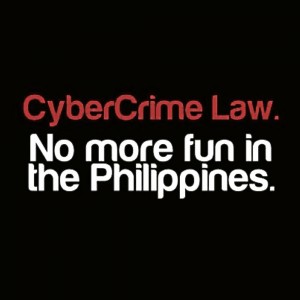Group calls cybercrime law a vestige of martial law
 MANILA, Philippines—Nearly three decades after the People Power Revolution, vestiges of martial law remain, with the administration still championing oppressive policies such as the cybercrime law, according to militant youth leaders.
MANILA, Philippines—Nearly three decades after the People Power Revolution, vestiges of martial law remain, with the administration still championing oppressive policies such as the cybercrime law, according to militant youth leaders.
Anakbayan chair Vencer Crisostomo said the cybercrime law continues to retain provisions that threaten freedom of expression, which hark back to the repression and intimidation that characterized the government just a few decades ago.
“The Cybercrime Law is an indelible proof that almost three decades since the Edsa uprising, state repression remains and continues to gain ground day by day. And just as what Edsa taught us, we have no other choice but to fight back,” Crisostomo said in a statement.
According to him, online libel could now be used as a tool to silence not just journalists, but also ordinary citizens who take to the Internet to criticize the government.
“Upholding the constitutionality of (penalizing) cyberlibel is a deathblow to Internet freedom. Now, not only journalists but common netizens can be targets of harassment and intimidation through trumped up charges filed by government instrumentalities,” he said.
He also castigated the upholding of the cybercime law provision imposing a penalty one degree higher for offenses committed under this measure, as well as those on the seizure and destruction of computer data.
The heavier penalty was another tool to silence dissent, he added.
Kabataan Rep. Terry Ridon also warned against the provision imposing such a penalty.
For instance, those who commit rebellion could get a 12- to 20-year jail sentence. But participants in online rebellion could get a 30 to 40 years in prison, he added.
He also criticized the provision that allows authorities to seize and destroy computer data.
“There is no mention on the conduct of accounting for the property seized, nor does the law require the presence of the persons owning such property to be seized, among other persons who must be present during the conduct of search-and-seizure operations,” he said.
The law even allows the destruction, after a certain period, of computer data that were subject to preservation and examination, Ridon lamented.
“This is a dangerous provision that allows the taking and destruction of private property without a determination whether such property are proceeds or instruments or related to a criminal act to merit continuing seizure and eventual destruction,” he said.
The Supreme Court recently upheld the cybercime law, but struck down the provision that allows the Department of Justice to block access to online content.
RELATED STORIES
Anti-cybercrime law: It may be harsh to call me a cybercriminal, but the new law says I am
SC justice says prosecution of cyber libel ‘clearly infirm’
Inquirer’s concerns on cyberlibel ‘exaggerated’














